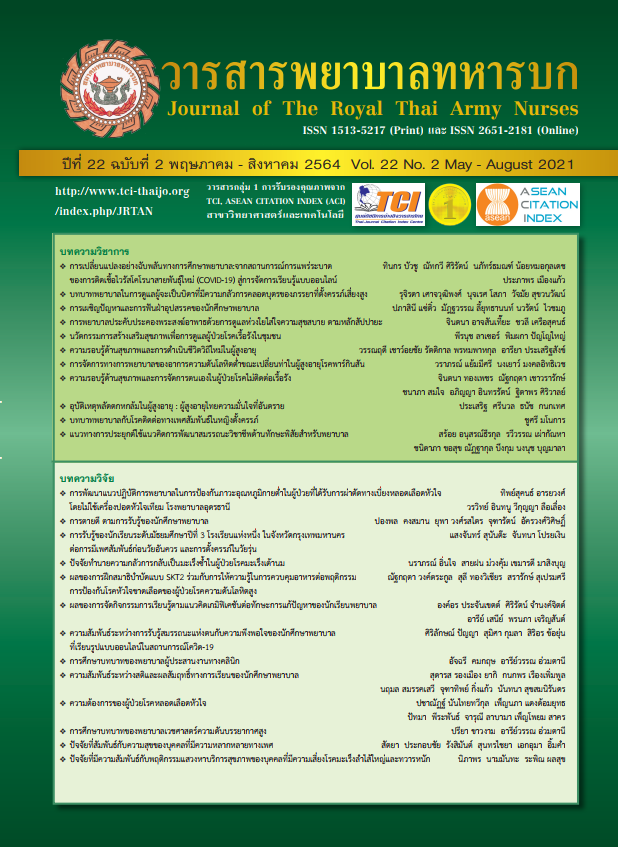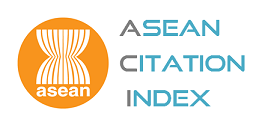ผลของการจัดกิจกรรมการเรียนรู้ตามแนวคิดเกมิฟิเคชันต่อทักษะการแก้ปัญหาของนักเรียนพยาบาล
บทคัดย่อ
การวิจัยแบบกึ่งทดลองครั้งนี้ ได้นำแนวคิดเกมิฟิเคชันมาใช้ในการศึกษา ซึ่งเป็นการบูรณาการการเล่นเกมเข้ากับการใช้ เทคโนโลยีการเรียนรู้ นำไปสู่การส่งเสริมการมีส่วนร่วม และการฝึกทักษะการแก้ปัญหาสถานการณ์ต่างๆ ในเกม ผู้วิจัยจึงสนใจนำ เกม “Solve the outbreak” มาจัดกิจกรรมการเรียนรู้ตามแนวคิดเกมิฟิเคชัน เพื่อให้ผู้เรียนเป็นนักสืบสวนการระบาด ในสถานการณ์ โรคระบาดรูปแบบต่างๆ โดยมีวัตถุประสงค์การวิจัยเพื่อ: 1) เพื่อเปรียบเทียบทักษะการแก้ปัญหาของนักเรียนพยาบาลก่อนและ หลังการจัดกิจกรรมการเรียนรู้ตามแนวคิดเกมิฟิเคชัน และ 2) เพื่อศึกษาความคิดเห็นของนักเรียนพยาบาลต่อการจัดกิจกรรมการ เรียนรู้ตามแนวคิดเกมิฟิเคชัน แบบแผนการวิจัยเป็นแบบศึกษาเปรียบเทียบในกลุ่มตัวอย่าง 1 กลุ่ม คือ นักเรียนพยาบาลชั้นปีที่ 2 จำนวน 63 คน ดำเนินการตามแผนการจัดการเรียนรู้ระยะเวลา 4 สัปดาห์ เครื่องมือที่ใช้เป็นแบบสอบถาม 2 ฉบับ ได้แก่ แบบทดสอบวัดทักษะในการคิดแก้ปัญหา และแบบสอบถามความคิดเห็นที่มีต่อการจัดกิจกรรมการเรียนรู้ตามแนวคิดเกมิฟิเคชัน ค่าความเชื่อมั่นของแบบทดสอบ (KR-20) มีค่าเท่ากับ 0.82 วิเคราะห์ข้อมูลโดยใช้สถิติบรรยาย และสถิติอ้างอิง Paired t-test
ผลการวิจัยพบว่า ทักษะการแก้ปัญหาของนักเรียนพยาบาลหลังเข้าร่วมการจัดกิจกรรมการเรียนรู้ตามแนวคิดเกมิฟิเคชัน สูงกว่าก่อนเข้าร่วมกิจกรรมอย่างมีนัยสำคัญทางสถิติที่ระดับ .05 นักเรียนมีความคิดเห็นว่า การเล่นเกมทำให้ได้เรียนรู้เกี่ยวกับ การจัดการโรคระบาด ไปพร้อมกับความสนุกสนานและมีส่วนร่วมในการเรียน สถานการณ์ในเกมกระตุ้นให้คิดแก้ปัญหาเพื่อรักษา ชีวิตของประชาชนให้ได้มากที่สุด
Downloads
เอกสารอ้างอิง
Yamnoon S. The new era of teaching and learning management in higher education. Proceedings of the operational conference on learning outcome, educational measurement and evaluation; 2012 June 21; Chiangmai, Thailand: Bangkok. 2012; 3-5. (in Thai)
Jongmuenwai B, Kongsrima K, Prachai S, Jabjone S, Suikraduang A. Gamification for Learning. Journal of Project in Computer Science and Information Technology. 2018; 4(2): 34-43. (in Thai)
Perryer C, Scott-ladd B, Leighton C. Gamification: Implications for workplace intrinsic motivation in the 21. Asian Forum on Business Education Journal. 2012; 5(3). 371-381.
Mc Grath N, Bayerlein L. Engaging online students through the gamification of learning materials: The present and the future. In 30th ascilite conference 2013 Proceedings. Macquarie University, Sydney. 2013; 573-77.
Phuwipadawathi S. Learner centeredness & authentic assessment. 3rded. Chiangmai: The knowledge Center; 2011. (in Thai)
Kim et al. The role of problem-solving ability on innovative behavior and opportunity recognition in university students. Journal of Open Innovation: Technology, Market, and Complexity. 2018; 4:4 DOI 10.1186/s40852- 018-0085-4.
Centers for Disease Control and Prevention. Solve the outbreak, Atlanta, GA; 2013.
Thaweecharoenkij W, Suratreungchai V. The development of instruction model to promote the problem-solving skill thinking of vocational students based on theory of constructionism. Ratchaphruek Journal. 2019; 17(1): 86-93. (in Thai)
Fabricatore C, López X. Using gameplay patterns to gamify learning experiences. In The European Conference on Games Based Learning. Academic Conferences & Publishing International; 2014.
Prajankett O. et al. The effect of cooperative learning using jigsaw on community health nursing process toward 21st century learning skills and community health nursing competency of nursing students. Journal of The Royal Thai Army Nurses. 2018; 19(3): 165-174. (in Thai)
Laisakul P. Gamification: change the world to game. Digital media animation 2014; 6. (in Thai)
Khowtrakul S. Education psychology. Bangkok: Chulalongkorn University Printing House; 2013. (in Thai)
Sariwat L. Psychology for teacher. Bangkok: Odeon Store press. 2014. (in Thai)
Dicheva, et al. Gamification in education: A systematic mapping study. Educational Technology & Society. 2015; 18(3): 75-88.
Chokpon P. The Enhancement cooperative behavior by using gamification approach for Matthayomsueksa 4 enrichment sciences students classroom of Phadungnaree school. (thesis). Mahasarakham: Rajaphat Mahasarakham University; 2015. (in Thai)
Dubickis M, Gaile-Sarkane E. Transfer of know-how based on learning outcomes for development of open innovation. Journal of Open Innovation: Technology, market, and complexity. 2017; 3(1): 4
Hayton C, Cholakova M. The role of affect in the creation and intentional pursuit of entrepreneurial ideas. Entrepreneurship Theory and Practice. 2012; 36(1): 41-68
ดาวน์โหลด
เผยแพร่แล้ว
รูปแบบการอ้างอิง
ฉบับ
ประเภทบทความ
สัญญาอนุญาต
บทความหรือข้อคิดเห็นใดใดที่ปรากฏในวารสารพยาบาลทหารบกเป็นวรรณกรรมของผู้เขียน ซึ่งบรรณาธิการหรือสมาคมพยาบาลทหารบก ไม่จำเป็นต้องเห็นด้วย
บทความที่ได้รับการตีพิมพ์เป็นลิขสิทธิ์ของวารสารพยาบาลทหารบก
The ideas and opinions expressed in the Journal of The Royal Thai Army Nurses are those of the authors and not necessarily those
of the editor or Royal Thai Army Nurses Association.







